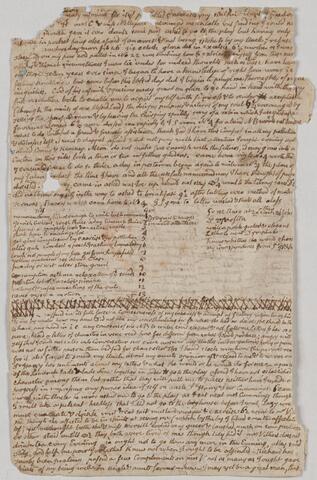
Identity area
Reference code
Title
Date(s)
- 1757-1776 (Creation)
Level of description
Extent and medium
34 pp.
Context area
Name of creator
Biographical history
The Monsells, of French extraction, were a plantation family from Dorsetshire, England, who had settled in Tervoe, county Limerick by the 1660s. Many of the early members of the family were prosperous merchants and landowners, most notably Samuel Monsell (d. 1735), a shipping merchant whose business extended from Ireland to England, France, Holland and Spain. Of his several sons, the eldest, William (1705-1772) became a lawyer. His second marriage in 1751 to Dymphna Pery (d. 1774), sister of Edmond Sexton Pery, MP and three-time Speaker of the Irish House of Commons, gave the Monsells not only a distinguished pedigree but considerable political influence. Their son, Colonel William Thomas Monsell (1754-1836), married Hannah Strettell of Dublin, whose father Amos Strettell was director of the Bank of Ireland. Their younger son, Thomas, became Archdeacon of Derry and was father to the noted hymnologist John Samuel Bewley Monsell and to the celebrated botanical artist Diana Conyngham Ellis née Monsell. Colonel Monsell’s elder son, William, was grandfather to and namesake of the distinguished politician William Monsell (1812-1894). His first wife, Anna Maria Wyndham Quin (1814-1855), whom he married in 1836, was daughter of the second Earl of Dunraven of Adare Manor, county Limerick, then one of the wealthiest men in Ireland. William Monsell was created 1st Baron Emly of Tervoe in 1874. The title became extinct on the death of his only surviving son, Thomas William Gaston Monsell (1858-1932), from his second marriage to Berthe de Montigny Boulainvilliers (d. 1890).
Archival history
Immediate source of acquisition or transfer
Content and structure area
Scope and content
Fragment of a diary sporadically kept by the Reverend Samuel Monsell (1743-1818), curate of Mallow from 1766 to 1780; Precentor of Ardfert from 1791 to 1811; and Vicar of Clondulane from 1805 until his death in 1818. Monsell was the younger son of the Reverend Daniel Monsell from his second marriage to Deborah née Tuthill and grandson of the shipping merchant William Monsell of Tervoe, county Limerick (for whose letter book see P29/1/1). He had a younger sister, Anne, and an older half-brother, Captain William Monsell, from his father's first marriage to a cousin, Mary née Monsell. At the time of diary, Samuel's uncle William Monsell and his second wife Dymphna née Pery resided at Tervoe.
Monsell appears to have derived the idea of journaling from Pythagoras’s advice to review one’s day at bedtime and in the morning and to have favoured the format of a commonplace book devised by the English physician and philosopher John Locke (1632-1704). References to a large commonplace book Monsell was compiling are scattered throughout the diary, and the uneven pagination suggests that it originally formed part of such or some other much more substantial document. The first part, paginated 34-58, comprises a coherent narrative, to which have been added fragments of six other pages. The first four of these are numbered 620, 669, 675 and 681, respectively, while the last two fragments bear no pagination.
The journal covers Monsell’s time as a student of theology at Trinity College, Dublin, where he enrolled in 1757, and his curacy in Mallow from 1766 until 1777. The diary is brooding and introspective, providing an intimate view of a tormented man who repeatedly fails in his attempts to lead a virtuous life and who seeks God’s forgiveness and the strength and discipline to mend his ways, only to fall time and again at the first hurdle. The diary is simultaneously an account of Monsell’s daily activities as a student and curate and a confessional in which he lays bare his sins. Throughout the course of the diary he is in perpetual debt and struggling to avoid his creditors. As a student, he steals books and food from his fellow students and makes futile attempts to ingratiate himself with his uncle and aunt at Tervoe in the unrealistic hope of succeeding to the property. As a curate, he keeps a mistress and has intimate encounters with other females, including married women. He is convinced that his parishioners entertain a low opinion of him and is haunted by the fear of being found out and by eternal damnation for his sins. He berates himself for his own behaviour yet appears incapable of change.
Apart from being a record of Monsell’s inner life, the diary contains a number of interesting details. These include a list of his clothes, a detailed description of his residence in Mallow, and frequent references to the compilation of a catalogue of books in his possession, some of which he inherited from his father. His private library appears to have been substantial, and some indication of its size can be found in his will (for which see P29/1/9).
Appraisal, destruction and scheduling
Accruals
System of arrangement
Conditions of access and use area
Conditions governing access
This item is too fragile to be safely handled and unavailable until conserved. For transcripts of the contents, see P29/1/12-13.
Conditions governing reproduction
Language of material
- Béarla
Script of material
Language and script notes
Physical characteristics and technical requirements
Paper document in fragile and damaged condition.
Finding aids
Allied materials area
Existence and location of originals
Existence and location of copies
Available digitally on the University of Limerick Digital Library at https://doi.org/10.34966/uldl.d74s-wc88
